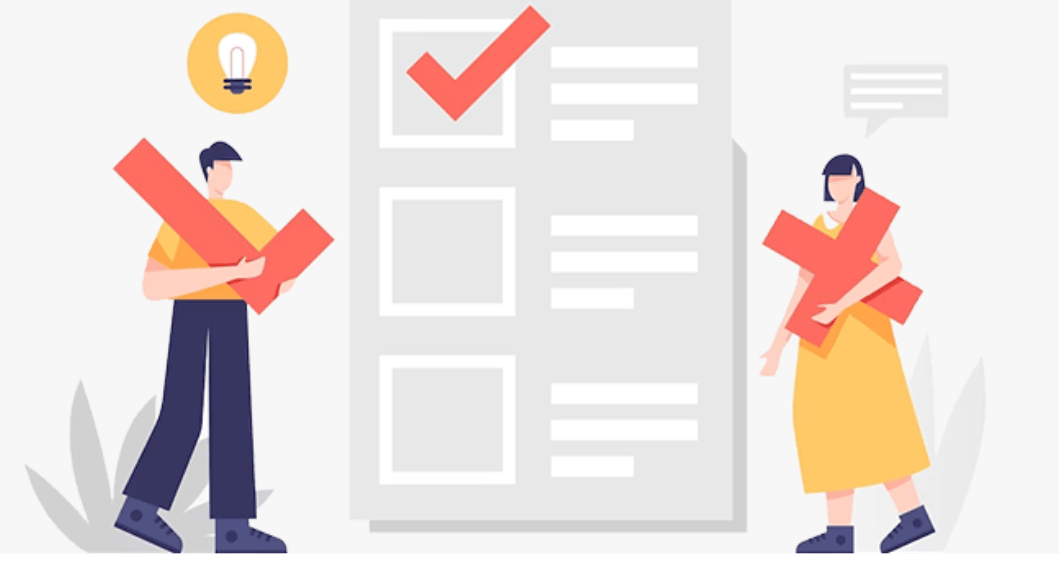Are you striving for career success but hit a plateau no matter how hard you work? You’re not alone – research suggests that developing effective workplace habits can significantly boost your career growth.
Our article delves into 10 actions, behaviors, and practices that can transform your productivity and set you on the path to achievement.
Key Takeaways
- Good work habits, such as effective communication and problem-solving skills, can greatly enhance your career success.
- Examples of good work habits include actively participating in meetings, dressing appropriately, using technology to stay organized, and seeking/providing assistance to colleagues.
- Tips for developing effective work habits include setting boundaries to eliminate distractions, setting short-term goals for motivation, improving self-awareness to identify areas of growth, and reflecting on your day to identify successes and challenges.
Why Work Habits Are Important for a Successful Career

Good work habits mean a lot for your career. They make you better at your job. You get things done faster and better. This makes you more important to your team.
Work habits also help you grow in your job. They teach you new skills, like problem-solving and time management. If people see that you have good work habits, they may trust you with big jobs or even promotions.
Finally, work habits can also give you a good day at work each day. When we plan our day, take short breaks, talk nicely about other workers—we feel good! We are happier in our jobs and do them well because of this happiness.
So as we can see, having good work habits is not just for today but also for our future success.
Examples of Good Work Habits

Contribute during meetings by actively participating and sharing ideas.
Contribute during meetings
Speak up during meetings. Your ideas are important and can help the whole team. Make sure your voice is heard. Sharing your thoughts can lead to better solutions and growth for everyone.
Being silent does not help you or others. It’s okay to ask questions too. This shows that you care about the work and want to do well. By sharing, asking, and speaking in meetings, you give value to yourself and your team.
Communicate effectively
You need good talk skills to do well at work. Clear and honest talk keeps your team in the loop. This helps avoid mix-ups. Make sure you listen too. Listening shows respect for other’s ideas.
It can also help solve problems better. Always check that others get your message right way, ask them if they got it or not, don’t guess! Good talking is both sending and getting messages the right way.
At last, use tech aids like email to confirm important talks so no one will forget or be confused later.
Take criticism well
Taking criticism well is an important work habit that can contribute to your success in the workplace. Instead of getting defensive or upset when receiving feedback, it’s essential to approach it with an open mind and a willingness to learn and improve.
By listening carefully to the criticism, you can gain valuable insights into areas where you can grow and develop. Taking criticism well also demonstrates professionalism and a commitment to self-improvement, which are highly valued qualities in the technology industry.
So, embrace feedback as an opportunity for growth and use it as a stepping stone towards achieving your career goals.
Dress appropriately
Dressing appropriately is an important work habit that can contribute to your success in the workplace. By dressing professionally, you show respect for yourself and others. It helps create a positive impression and conveys your professionalism and competence.
Dressing appropriately also means conforming to the dress code of your workplace, whether it’s business casual or formal attire. This demonstrates that you understand and respect the expectations of your organization.
Remember, by dressing well, you not only look good but also feel confident, which can positively impact your performance at work.
Use technology to organize better
Technology can be a helpful tool when it comes to organizing your work effectively. By using digital tools and apps, you can keep track of your tasks, deadlines, and appointments all in one place.
This allows you to stay on top of your responsibilities and ensures that nothing falls through the cracks. You can also use technology to create reminders and alerts so that you never miss an important deadline or meeting.
With the help of technology, you can streamline your workflow and increase your productivity in the workplace.
Moreover, technology can also assist with managing documents and files more efficiently. Instead of dealing with stacks of papers or searching through folders for specific information, you can store everything digitally.
This not only saves physical space but also makes it easier to access documents whenever needed. With cloud storage services like Google Drive or Dropbox, you can even collaborate with others by sharing files easily.
Seek and provide assistance
In the workplace, it’s important to be willing to ask for help when needed and also offer assistance to others. Seeking assistance shows that you are proactive and eager to learn, while providing help demonstrates your teamwork skills.
Being open to asking for guidance or clarification can prevent mistakes and promote personal growth. Additionally, offering support to your colleagues creates a positive work environment where everyone feels valued and supported.
It’s important to remember that seeking and providing assistance is essential in fostering collaboration, building relationships, and achieving success in your career journey.
Go above and beyond
One important work habit for a successful career is going above and beyond. This means putting in extra effort and doing more than what is expected of you. It shows your dedication to your work and helps you stand out from others.
Going above and beyond can include taking on additional tasks, volunteering for projects, or offering creative solutions to problems. By going the extra mile, you demonstrate your commitment to excellence and increase your chances of success in the workplace.
Keep personal problems out of the workplace
It’s important to keep personal problems out of the workplace. Bringing personal issues to work can affect your productivity and create a negative atmosphere. It’s best to leave your personal problems at home and focus on your job while you’re at work.
This allows you to give your full attention to your tasks and maintain a professional attitude. Keeping personal matters separate from work helps you stay focused, avoid unnecessary stress, and maintain good relationships with colleagues.
By doing this, you can create a more positive work environment for yourself and those around you, leading to greater success in your career.
Look at problems as opportunities
One important work habit for a successful career is to look at problems as opportunities. When faced with challenges or obstacles, it’s essential to approach them with a positive mindset and see them as chances for growth and learning.
Instead of getting discouraged or overwhelmed, try to view problems as a way to showcase your problem-solving skills and creativity. By embracing challenges, you can develop innovative solutions that not only overcome the problem at hand but also contribute positively to the overall success of your work.
Being able to see problems in this way demonstrates resilience, adaptability, and an ability to think outside the box, which are all valuable qualities in the technology industry where new problems often arise.
Stick to deadlines
One important work habit for a successful career is sticking to deadlines. This means completing your tasks or projects on time, as agreed upon with your team or supervisor. Meeting deadlines shows that you are reliable and can be trusted to deliver results in a timely manner.
It also demonstrates good time management skills and helps maintain productivity in the workplace. By honoring deadlines, you contribute to the overall success of projects and reinforce a positive work culture based on dependability and accountability.
Keeping track of deadlines, prioritizing tasks, and effectively managing your time are key strategies for meeting this work habit.
Example fact: Being punctual with project deliverables allows you to gain the trust and respect of your colleagues and supervisors.
Tips for Developing Effective Work Habits

Set boundaries and eliminate distractions to improve focus and productivity. Set short-term goals to stay motivated and track progress. Improve self-awareness to identify areas for growth and development.
Use a calendar or task management app to schedule tasks and stay organized. Take care of your health by getting enough sleep, exercising, and eating well. Utilize your energy effectively by recognizing peak times of productivity.
Avoid stress and burnout by practicing self-care strategies such as mindfulness or taking breaks throughout the day. Get comfortable with your work environment by organizing your workspace in a way that promotes efficiency.
Reflect on your day to identify successes, challenges, and opportunities for improvement.
Set boundaries and eliminate distractions
To be more focused and productive at work, it is important to set boundaries and eliminate distractions. Here are some ways to do that:
- Create a designated workspace where you can concentrate on your tasks without interruptions.
- Turn off notifications on your phone or computer to avoid being constantly distracted by emails, messages, or social media updates.
- Set specific times for checking and responding to emails instead of constantly checking throughout the day.
- Use time – blocking techniques to schedule dedicated periods for different tasks, minimizing the likelihood of getting sidetracked.
- Communicate with colleagues about your need for uninterrupted work time and establish guidelines for when interruptions are acceptable.
- Take breaks when needed but use them intentionally. Step away from your workspace and engage in activities that help you recharge rather than getting caught up in unproductive ones.
Set short-term goals
Setting short-term goals is an effective work habit that can help you stay focused and motivated. Here are some tips for setting short-term goals:
- Break down your long – term goals into smaller, achievable targets.
- Prioritize your goals based on their importance and urgency.
- Set specific and measurable objectives for each goal.
- Create a timeline or deadline to track your progress.
- Celebrate small wins along the way to stay motivated.
- Regularly review and adjust your goals as needed.
Improve self-awareness
Improving self-awareness is an important work habit that can lead to a successful career. It allows you to understand your strengths and weaknesses, which helps you make better decisions and set realistic goals. Here are some ways to improve self-awareness:
| Ways to Improve Self-Awareness | Description |
|---|---|
| Reflect on Your Actions and Choices | Take time to analyze your decisions and behavior to identify patterns and learn from past experiences. |
| Seek Feedback | Ask for honest feedback from colleagues, mentors, or supervisors to gain insights into how others perceive your performance and behavior. |
| Practice Mindfulness | Engage in mindfulness exercises like meditation or deep breathing to become more present and tune into your thoughts, emotions, and reactions. |
| Keep a Journal | Regularly write down your thoughts and feelings to gain clarity about your motivations, values, and aspirations. |
| Take Personality Assessments | Explore tools like the Myers-Briggs Type Indicator (MBTI) or StrengthsFinder to gain insights into your personality traits and strengths. |
| Engage in Self-Reflection | Set aside dedicated time each day to reflect on your actions, goals, and progress, considering what went well and what could be improved. |
Use a calendar to schedule tasks
A calendar is a helpful tool for managing your tasks and staying organized. Here are some reasons why you should use a calendar:
| Benefit | Description |
|---|---|
| Stay on Top of Deadlines | By scheduling your tasks on a calendar, you can easily see when assignments or projects are due and plan your time accordingly. |
| Prioritize Effectively | A calendar allows you to prioritize your tasks based on their importance and deadlines. This helps you focus on what needs to be done first. |
| Avoid Overbooking | By visualizing your schedule on a calendar, you can see if you have too many commitments or if certain tasks need to be rescheduled. |
| Plan for Long-Term Goals | Use the calendar to set milestones and reminders for achieving your long-term goals. This will help you stay focused and motivated. |
| Allocate Time for Breaks and Self-Care | It’s important to take breaks and prioritize self-care in order to maintain productivity and overall well-being. A calendar can help you allocate specific times for these activities. |
Take care of your health
Taking care of your health is crucial for success in the technology industry. Here are some tips:
| Tips | Description |
|---|---|
| Get Enough Sleep | Adequate rest helps you stay alert and focused during work hours. |
| Eat a Balanced Diet | Nutritious meals nourish your body and provide the energy needed for optimal work performance. |
| Stay Hydrated | Drinking enough water throughout the day helps maintain concentration and prevents fatigue. |
| Exercise Regularly | Physical activity boosts mood, reduces stress, and enhances overall fitness. |
| Practice Good Posture | Maintaining proper posture while sitting or standing prevents strain on your back, neck, and shoulders. |
| Take Breaks | Short breaks throughout the day help recharge your mind and prevent burnout. |
| Practice Stress Management Techniques | Find healthy ways to cope with stress, such as deep breathing exercises or mindfulness practices. |
| Limit Screen Time Outside of Work | Giving your eyes a break from screens can prevent eye strain and improve sleep quality. |
Utilize your energy effectively
To be successful in your career, it’s important to utilize your energy effectively. Here are some tips:
- Prioritize tasks based on importance and urgency.
- Break larger tasks into smaller, manageable steps.
- Take short breaks to rest and recharge throughout the day.
- Use your peak energy times for more challenging or creative work.
- Delegate tasks when possible to avoid burnout.
- Stay physically active and maintain a healthy lifestyle to increase overall energy levels.
- Minimize distractions and focus on one task at a time.
- Practice stress management techniques, such as deep breathing or meditation, to conserve energy.
- Set realistic goals and pace yourself to avoid feeling overwhelmed.
- Celebrate your accomplishments to stay motivated.
Avoid stress and burnout
To maintain a successful career, it is important to avoid stress and burnout. Here are some tips to help you manage stress effectively:
| Tips | Description |
|---|---|
| Prioritize Self-Care | Take breaks, exercise regularly, and get enough sleep to recharge your energy and well-being. |
| Practice Relaxation Techniques | Engage in activities like deep breathing exercises, meditation, or yoga to reduce stress levels and promote relaxation. |
| Set Boundaries | Learn to say no when your workload becomes overwhelming, and delegate tasks when possible to manage your workload effectively. |
| Manage Your Time Effectively | Prioritize tasks, create a schedule, and avoid procrastination to stay organized and reduce stress related to time management. |
| Seek Support | Reach out to colleagues, friends, or family for advice, assistance, and emotional support when needed to cope with stress. |
| Take Regular Breaks | Step away from your work area periodically to refresh your mind and prevent burnout, maintaining your productivity and well-being. |
| Find Healthy Outlets for Stress Relief | Engage in hobbies or activities that help you relax and unwind after work to release stress and tension. |
| Maintain a Positive Mindset | Focus on the positive aspects of your work that bring joy and satisfaction, promoting a more optimistic outlook on your career. |
| Foster a Supportive Work Environment | Identify coworkers or mentors who can offer guidance and create a positive atmosphere at work, contributing to reduced stress levels. |
| Seek Professional Help if Needed | If stress becomes overwhelming, consider seeking help from a therapist or counselor who can provide effective coping strategies and support. |
Get comfortable with your work environment
To be successful in your career, it’s important to feel comfortable in your work environment. Here are some tips:
- Personalize your workspace with items that make you feel happy and motivated.
- Set up your chair and desk ergonomically to avoid physical discomfort.
- Ensure good lighting in your workspace to reduce eye strain and fatigue.
- Keep your workspace organized and clutter – free for better focus and productivity.
- Get familiar with the technology and tools you use daily to work efficiently.
- Take breaks and stretch regularly to prevent stiffness or muscle tension.
Reflect on your day
Reflecting on your day can help you improve your work habits and enhance your overall productivity. Here are some ways to do it:
- Take a few minutes at the end of each day to think about what went well and what could have been better.
- Review your accomplishments and identify any tasks that still need attention.
- Consider the challenges you faced and brainstorm possible solutions for next time.
- Evaluate how effectively you managed your time and adjust your schedule if necessary.
- Assess whether you communicated clearly with colleagues and clients, and aim to improve any areas of weakness.
- Reflect on how well you maintained a positive attitude and handled stress throughout the day.
- Use this reflection time to set goals for the next day or week, focusing on areas where you want to improve.
Bad Work Habits to Avoid

Avoiding bad work habits is just as important as cultivating good ones. Here are some habits you should steer clear of in order to have a successful career:
| Bad Work Habits to Avoid | Description |
|---|---|
| Procrastination | Putting off tasks until the last minute can lead to rushed and inferior results. Break tasks into smaller chunks and set deadlines for better time management. |
| Poor Time Management | Failing to prioritize tasks or allocate enough time for them can result in missed deadlines and increased stress. Use tools like calendars or task management apps to stay organized. |
| Lack of Communication | Not keeping others informed about your progress or failing to ask for help when needed can hinder collaboration and productivity. Effective communication with colleagues, managers, and team members is essential. |
| Negative Attitude | Constant complaining, gossiping, or displaying a negative mindset can create a toxic work environment and damage professional relationships. Maintain a positive outlook and focus on finding solutions rather than dwelling on problems. |
| Lack of Accountability | Avoid passing blame onto others when things go wrong. Take responsibility for your actions and learn from mistakes to foster a more accountable work ethic. |
By avoiding these bad work habits, you’ll be able to increase your productivity, build better relationships with colleagues, demonstrate professionalism, and ultimately thrive in your career.
Conclusion.
In conclusion, developing effective work habits is crucial for a successful career. By practicing good habits like effective communication, problem-solving skills, and punctuality, you can boost your productivity and achieve your goals.
Remember to prioritize self-discipline, continuous learning, and maintaining a positive work-life balance to pave the way for long-term success in the workplace. Start implementing these habits today and watch your career soar!
Frequently Asked Questions
What are some examples of effective work habits?
Examples of effective work habits include being organized, managing time efficiently, setting goals, communicating effectively, staying focused, and collaborating with coworkers.
How can I improve my work habits for a successful career?
You can improve your work habits by prioritizing tasks, avoiding procrastination, practicing good communication skills, seeking feedback to grow and learn, and maintaining a positive attitude.
Why are effective work habits important for a successful career?
Effective work habits are important for a successful career because they help increase productivity, reduce stress and errors in the workplace, enhance professional relationships and teamwork skills, and contribute to personal growth and advancement opportunities.
How long does it take to develop effective work habits?
The time it takes to develop effective work habits varies from person to person. It depends on individual motivation, consistency in practicing new behaviors or techniques daily over an extended period—usually several weeks or months—to form lasting habits.
Can anyone develop effective work habits?
Yes! Anyone can develop effective work habits with dedication and commitment to self-improvement. It may require effort initially but consistent practice can lead to the development of positive routines that support success in one’s career.




